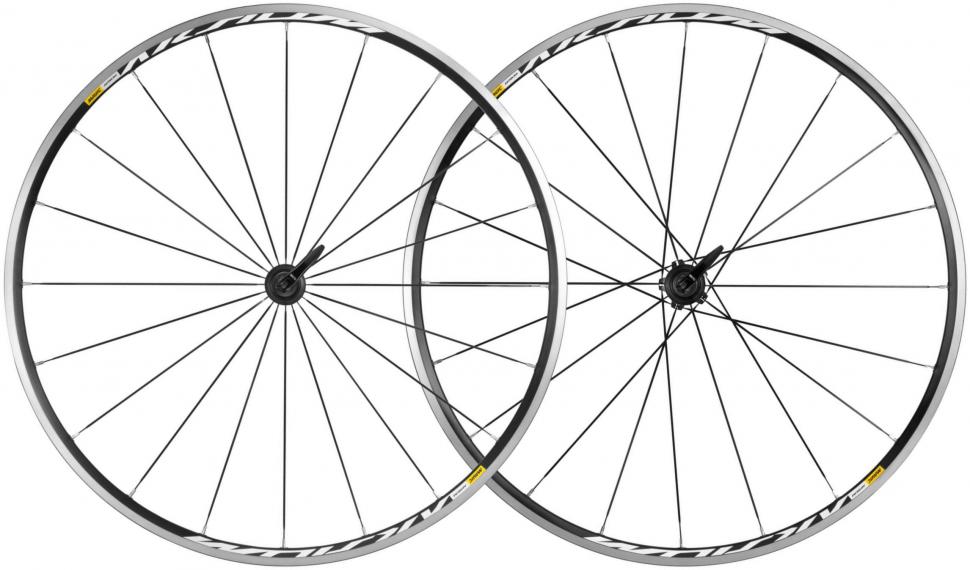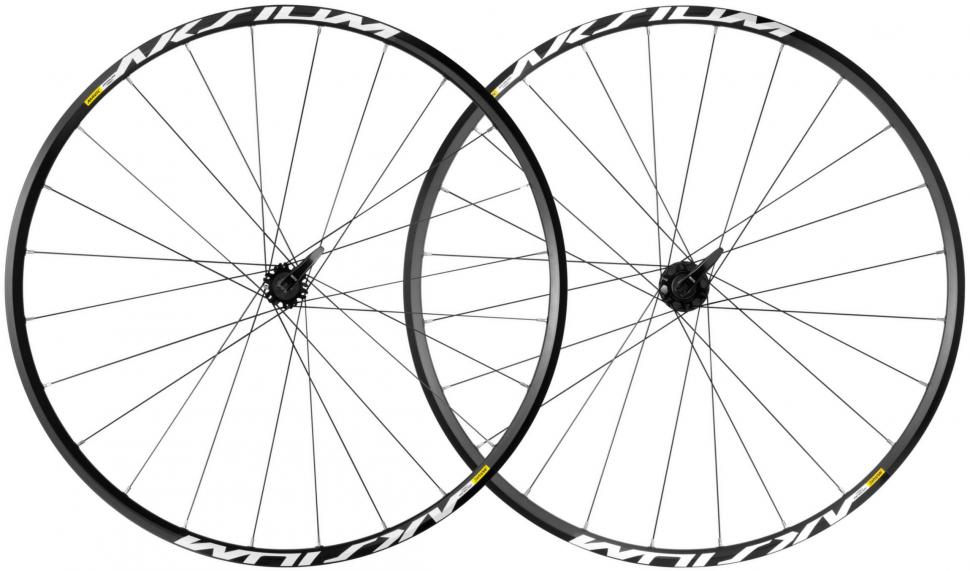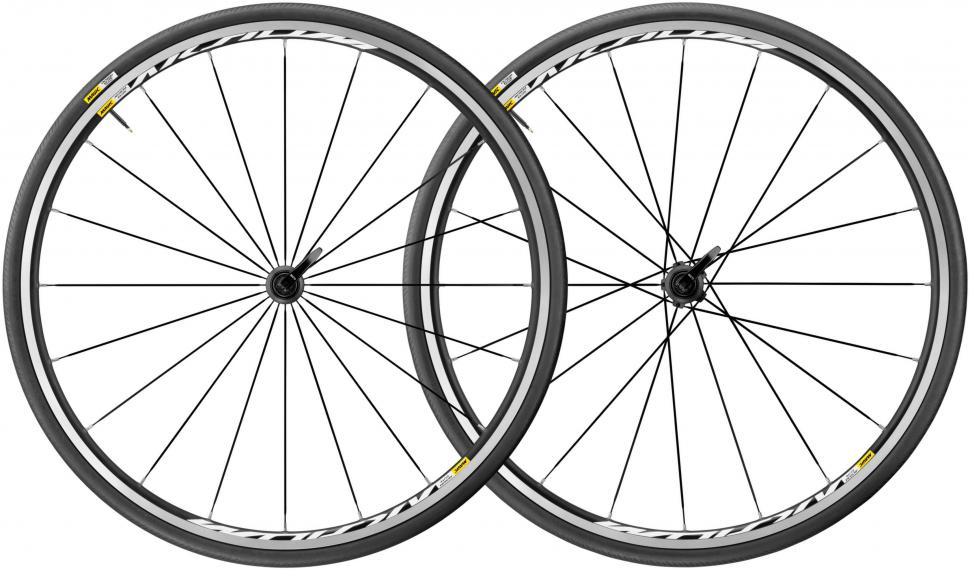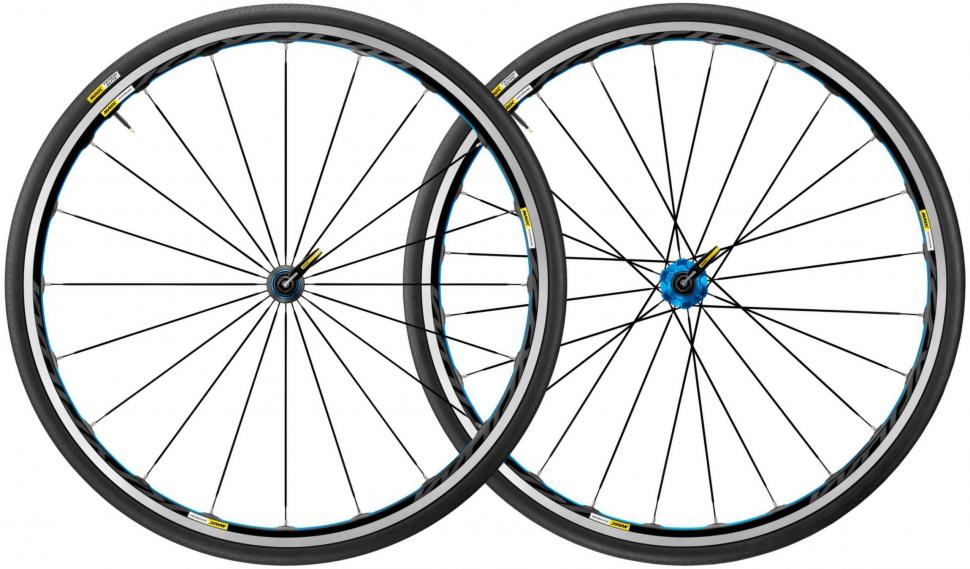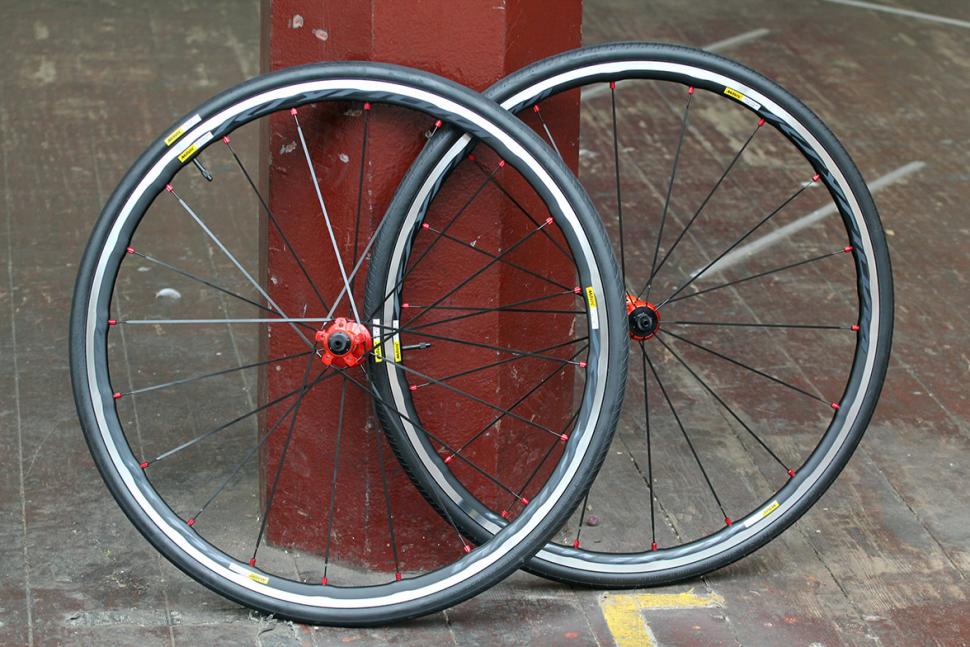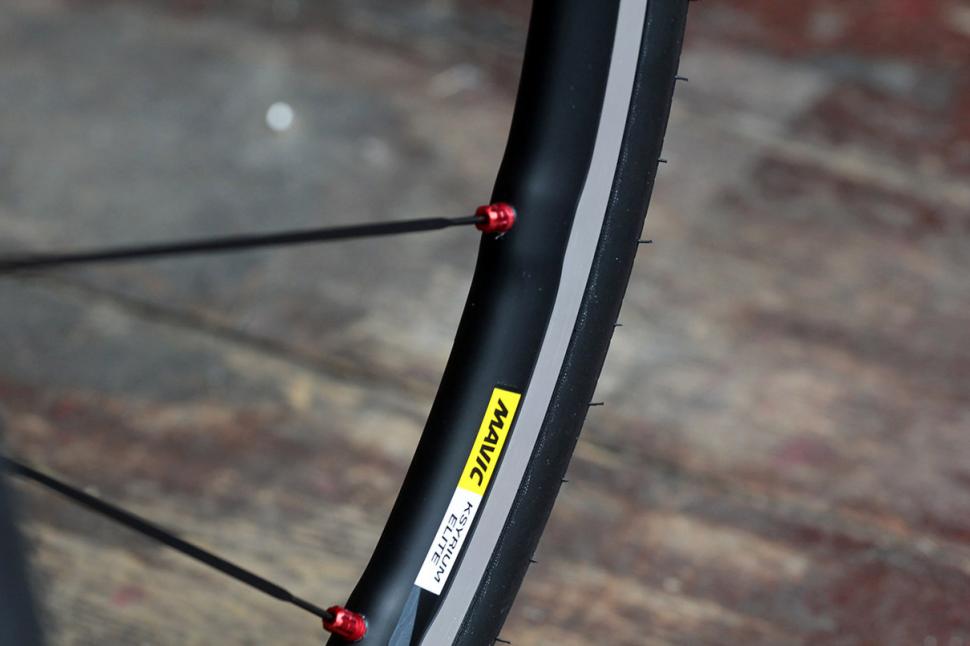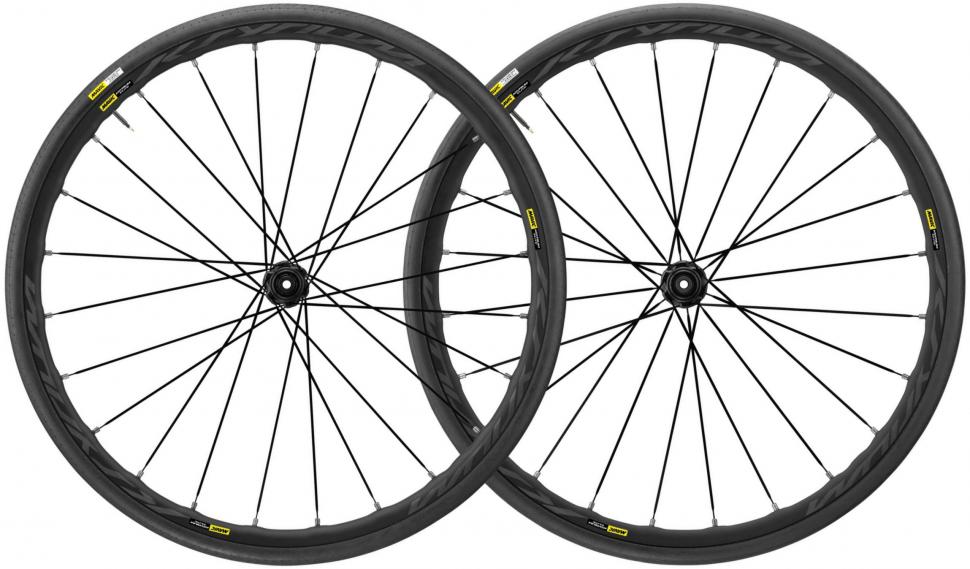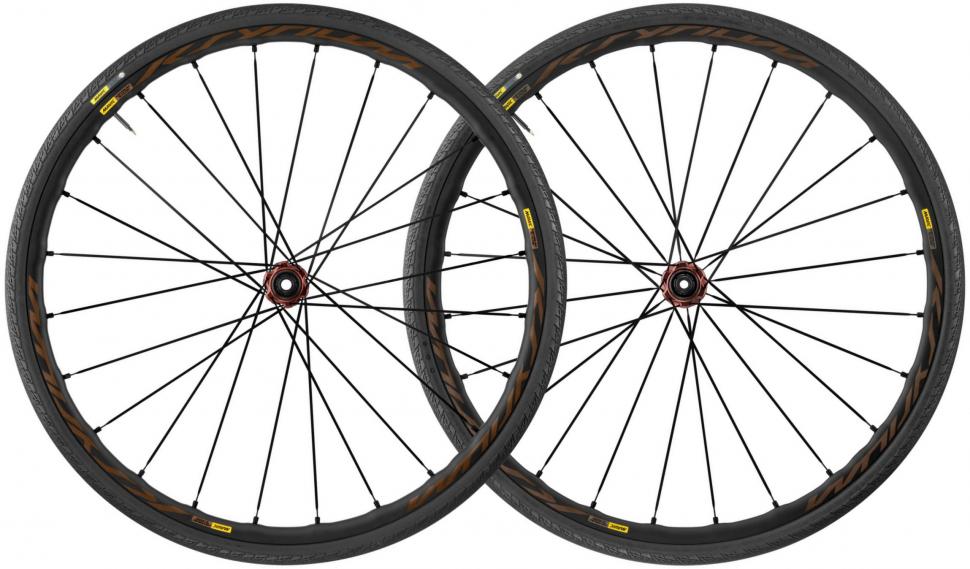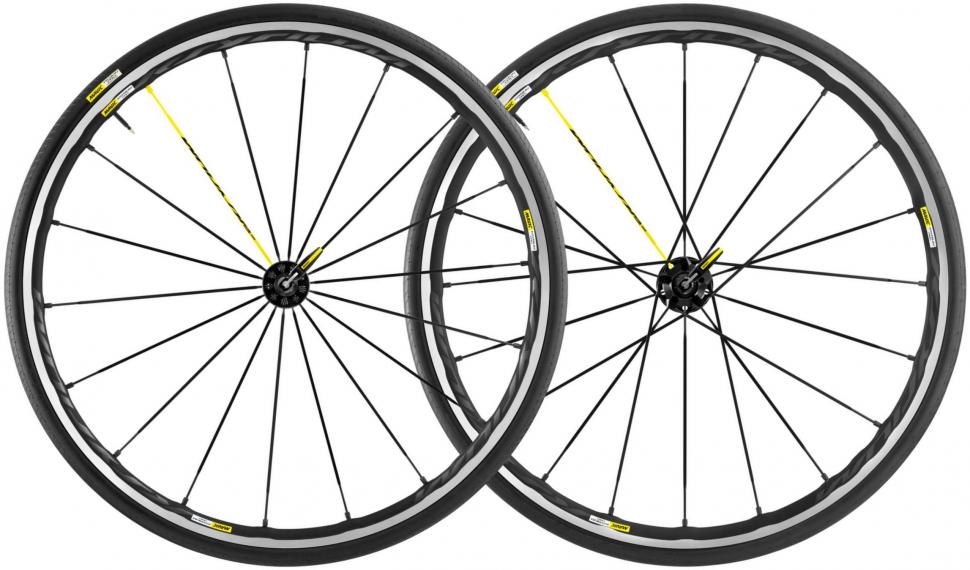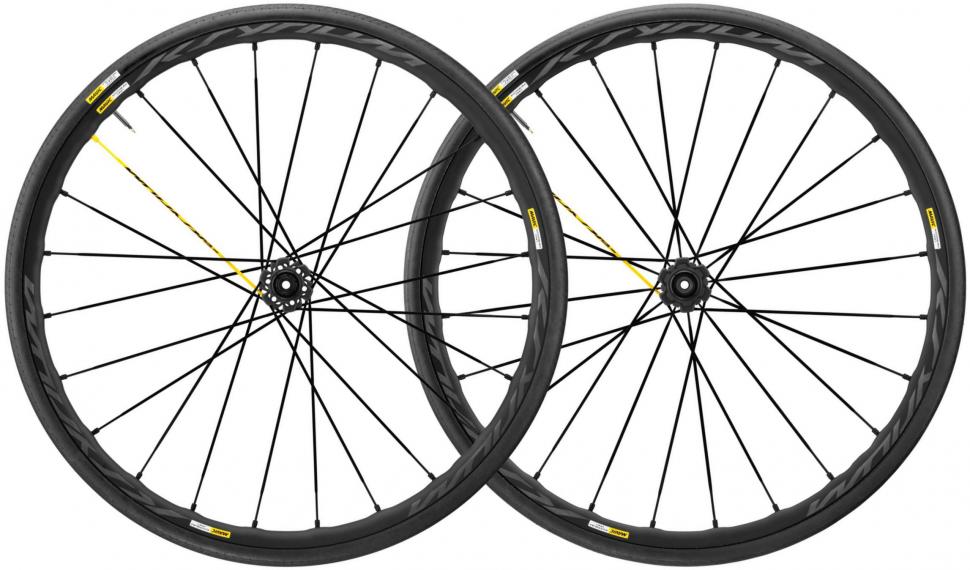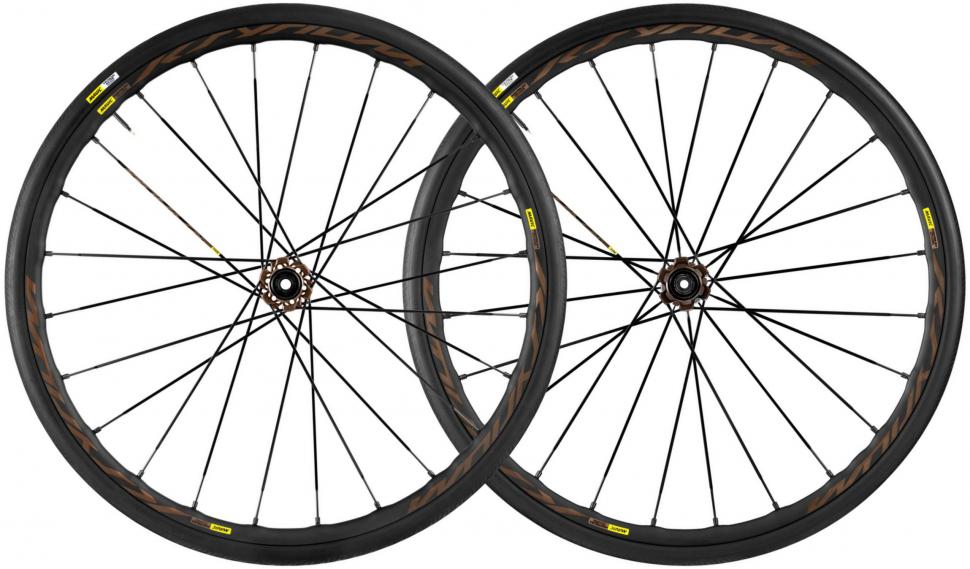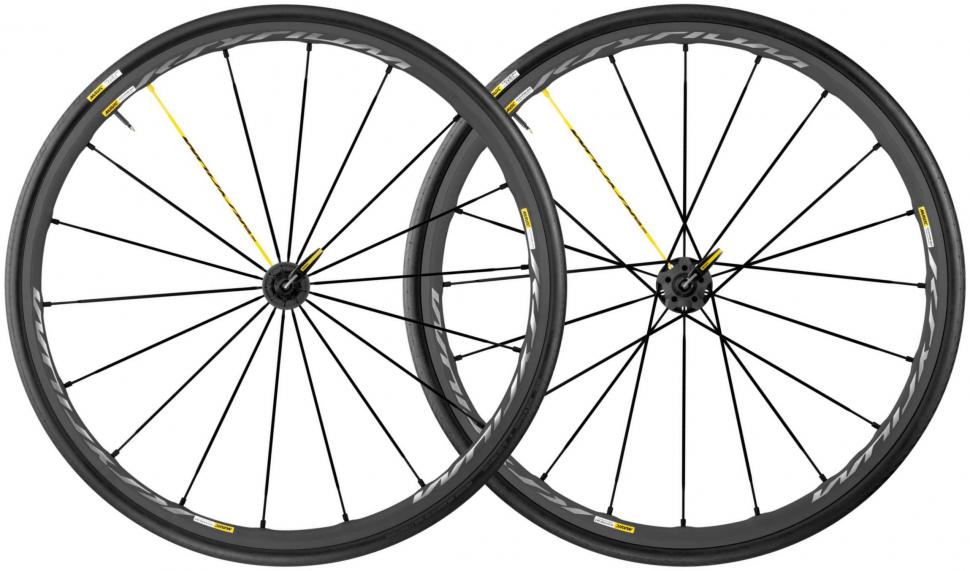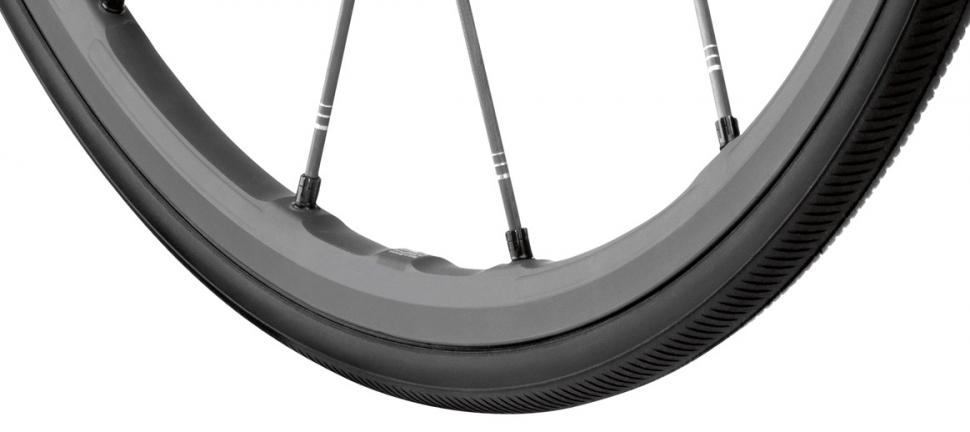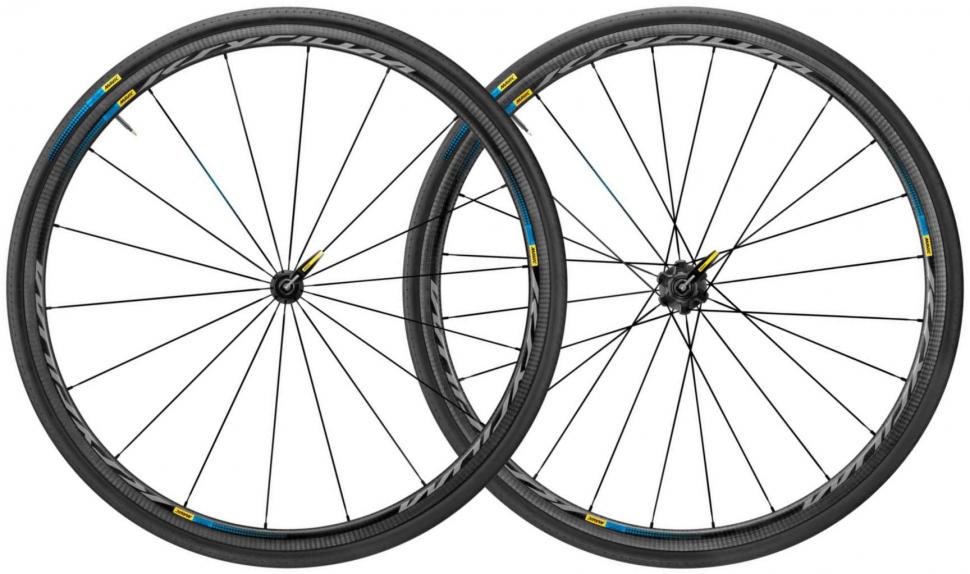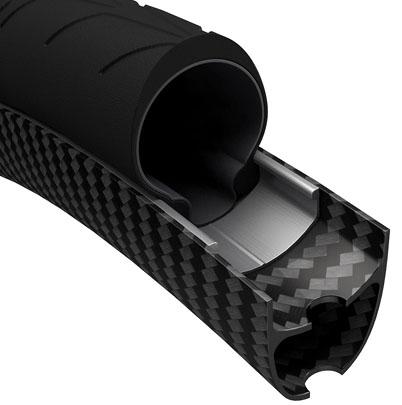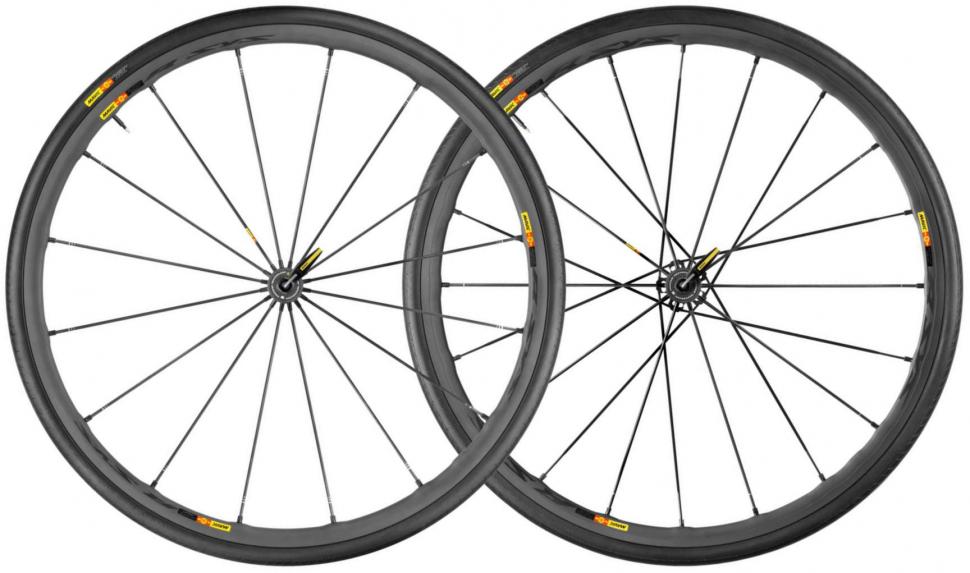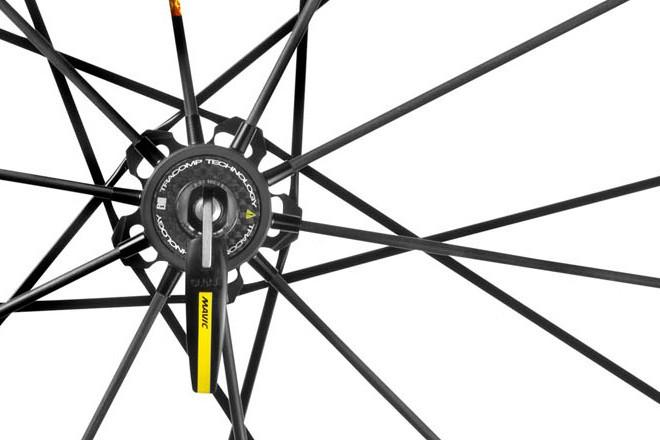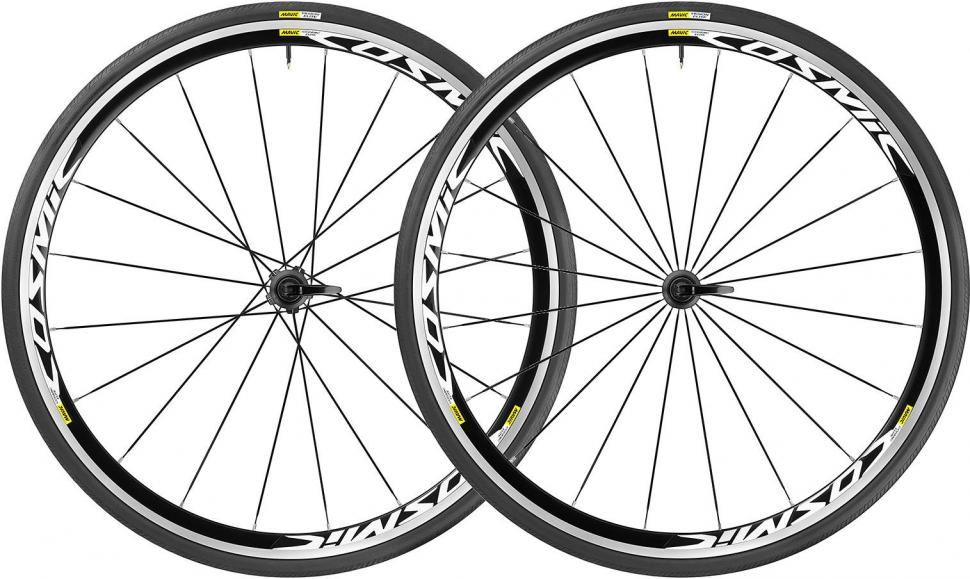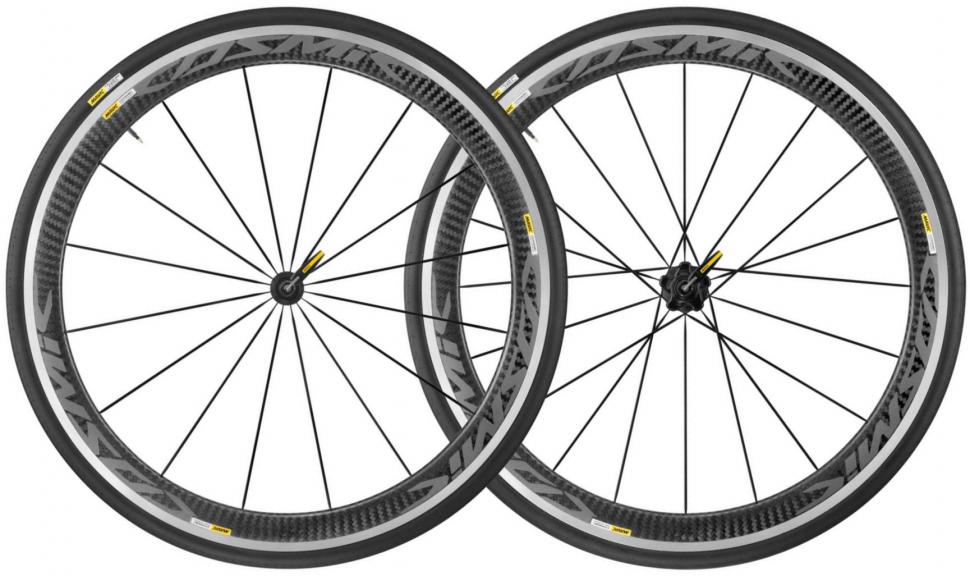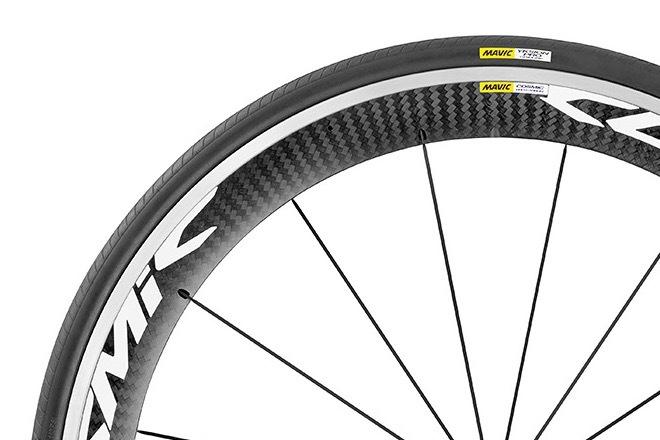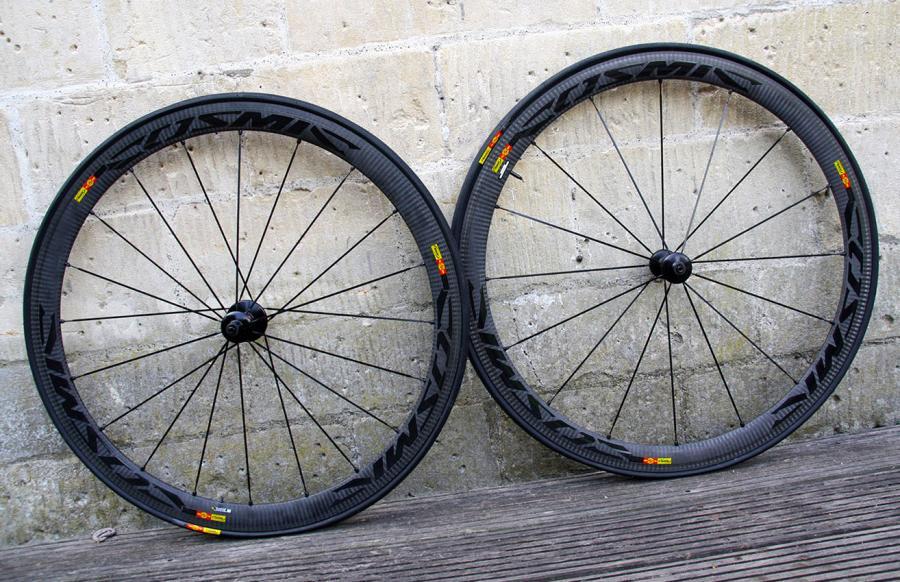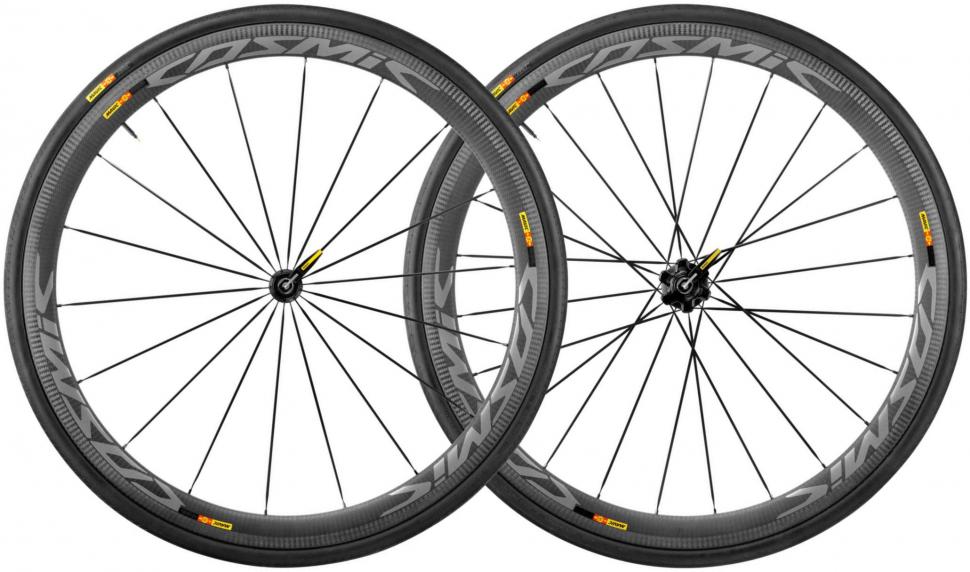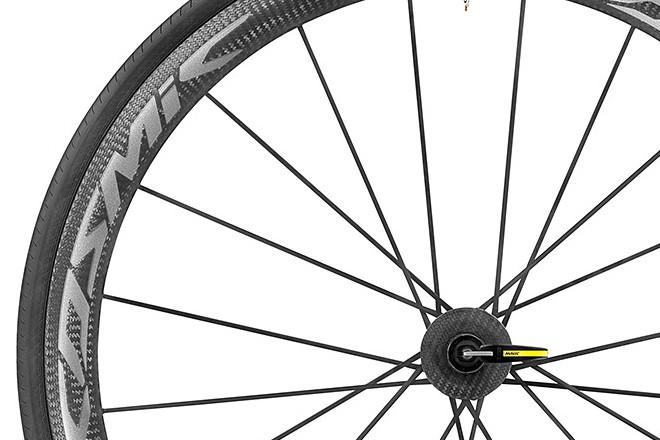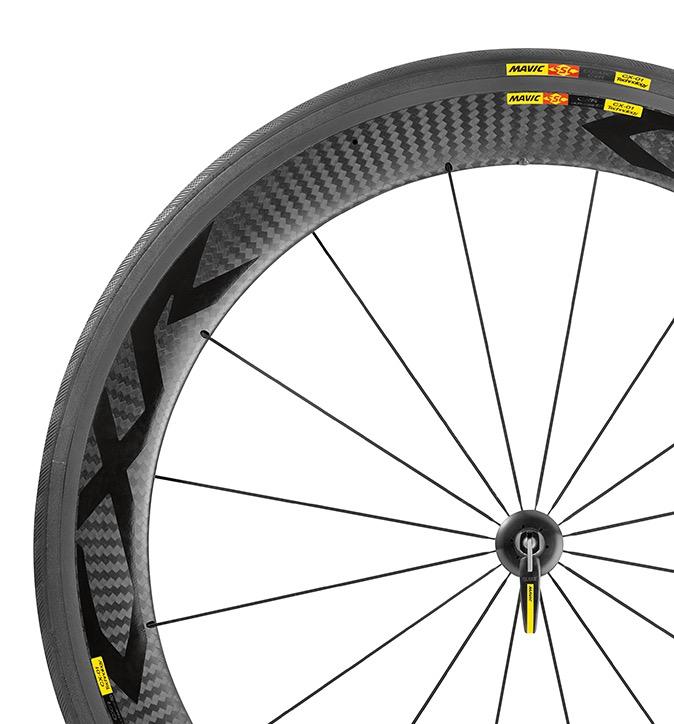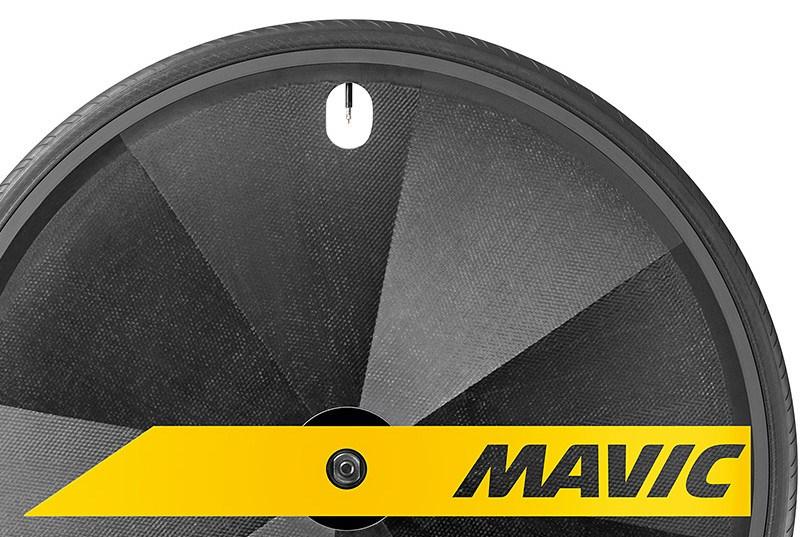French brand Mavic makes some of the most popular bike wheels out there. It doesn’t produce anything super-cheap, its road bike options starting at £150 and going right through to £2,000.
Apart from the cheapest Aksiums, Mavic’s road wheels come equipped with tyres because the brand sees them working together as complete systems.
The range is large and could be somewhat confusing, so we’ll try to break it down as logically as possible.
Fact of the day: Mavic is actually an acronym coming from Manufacture d'Articles Vélocipédiques Idoux et Chanel, Charles Idoux and Lucien Chanel having founded the company well over a century ago.
Endurance wheels
Aksium
Aksiums (£144) are Mavic’s entry level road wheels, specced as original equipment on countless bikes. They have 21mm high pinned aluminium rims that were widened for the 2016 model to 17mm internal width to better accommodate increasingly popular wide tyres. Mavic reckons Aksiums are best suited to tyres from 25mm to 32mm.
Like the rest of the range, Aksiums are built with straight pull spokes which the brand says are stronger than J-bend options, and they run on the brand’s QRM sealed cartridge bearings. That keeps maintenance down to a minimum. The hub bodies are aluminium while the axles and the freewheel are steel.
Aksiums are reasonably light for the money (a claimed 865g front, 1,015g rear) and we’ve found them to be quick and generally reliable. These are good, solid all-rounders.
Check out our Mavic Aksium review.
The Aksium Disc (£149) uses the same rims and bearings but with either a centrelock or six bolt disc hub, and more spokes: 24 front and rear as opposed to 20 front and rear. The front hub is convertible from a standard quick release to a 15mm thru-axle design.
Aksium Elites (£198) are a bit lighter than standard Aksiums at a claimed 1,735g (800g front, 935g rear) because Mavic joins the two ends of the rim using a sleeve rather than a pinned joint.
Unlike the other Aksiums, the Elites come with Mavic’s own all-season Yksion Elite Guard tyres with a 120TPI (threads per inch) casing and a nylon anti-puncture breaker that runs from one bead to the other.
Buy if: You're looking for reliable training wheels that aren't too expensive.
Ksyrium range
Mavic’s Ksyrium wheels have gradually evolved since 1999, building up a reputation for combining light weight with loads of strength. You might see the cheaper models as workhorse wheels but the higher up the range you go the higher the performance you get for your money.
Ksyrium
The lower priced models are made with box section aluminium rims, in the case of the most basic Ksyrium (£329) they’re 25mm high with recommended tyre sizes of 23mm to 25mm. Mavic use the same QRM sealed cartridge bearings as you get with the Aksiums, and Yksion Elite tyres come as part of the package.
The claimed wheelset weight is 1,690g (77g front, 920g rear), which is pretty light for this price, although it’s combining that with a bombproof performance that makes this a popular choice.
The Ksyrium Disc (also £329) is essentially the same wheel but with disc hubs and four extra spokes per wheel.
Buy if: You're after something that's reasonably light and very sturdy.
Ksyrium Elite
The Ksyrium Elite (£473) is made of a different material from the cheaper wheels in the range: an aluminium alloy that Mavic calls Maxtal. It has a higher strength to weight ratio than the 6106 aluminium alloy commonly used in rim manufacture. Mavic reduces the rim weight further by milling away material between the spokes. It uses this technique, which it calls ISM 4D, on all of its higher end aluminium rims.
The spoke nipples are screwed directly into the rim as the holes are ‘pushed’ through the inside wall rather than drilled, the pushed up material then being threaded to allow the nipple to be secured.
To make the Elites user serviceable, Mavic has installed steel double sealed bearings that are fully adjustable, even chucking in the tool you need to do it.
When we reviewed the Ksyrium Elites earlier in the year we said, “Great mid-range wheels for the all-rounder, as happy to race as they are to cruise, but the tyres are average.”
Read our review of the Mavic Ksyrium Elite.
For 2017 Mavic has expanded the Ksyrium Elite range with two models for disc-braked bikes, the Ksyrium Elite Disc and Ksyrium Elite Allroad Disc.
The Ksyrium Elite Disc (£540) uses a similar rim to the regular Ksyrium Elite with a disc-compatible hub. There are versions to take six-bolt rotors or those with Shimano's Center Lock mount. They weigh a claimed 770g and 900g for front and rear respectively and come with Mavic's Yksion Pro GripLink and PowerLink tyres.
The Ksyrium Elite Allroad Disc (£558) wheels are Mavic's mid-range tubeless-compatible road hoops, with 19mm internal-width rims for strength and to boost the volume of whatever tyres you fit. As the name suggests they're intended to venture beyond the Tarmac on to dirt roads and trails. They're just a shade heavier than the regular Ksyrium Elite Discs at 780g and 910g front and rear.
>>Read more: Mavic Ksyrium Pro Disc All Road wheels review
>>Read more: Everything you need to know about road tubeless
Buy if: You want solid all-rounders that are light enough to race.
Ksyrium Pro
The Ksyrium Pro (£698) got a new rim for 2016, with a 17mm wide rim bed, which Mavic claims was good for a 17% reduction in rolling resistance when used with a 25mm tyre, compared to the previous 15mm rim and a 23mm tyre.
Looked at another way, you can lower the tyre pressure (you get 25mm Mavic Yksion Pro GripLink/PowerLinks as part of the package) by 20PSI for a more comfortable ride while maintaining the same rolling resistance as with a narrower rim and tyre.
Unlike the cheaper models in the Ksyrium range, the Pro is built with Zicral alloy spokes which Mavic says are stiffer, stronger and lighter than traditional stainless steel spokes.
We’re getting down to some very light weights now, the Ksyrium Pros coming in at a claimed 1,475g (630g front, 845g rear).
The Ksyrium Pro SL (£698) is a very similar wheelset but it’s even lighter at 1,395g (600g front, 795g rear).
Buy if: You want a lightweight wheelset that doesn't compromise on durability.
Ksyrium Pro Disc
Mavic has updated the standard Ksyrium Pro Disc (£739) for 2017, finally bringing its features into line with the other wheels in the Ksyrium Pro family. Rim width has gone up to 17mm and the finish and style now matches the other Ksyrium Pros.
Like the Ksyrium Pro Disc Allroads, the hubs on the Ksyrium Pro Discs are compatible with the increasing number of axle standards that are available for road disc. Standard quick release is covered, as is QR15 at the front and 142x12 at the back. And as well as those, the Pro Allroad WTS comes shipped with QR12 front hardware.
The Ksyrium Pro Disc Allroad (£738) was launched in 2015. Given that the most likely place to find a set of Ksyriums is probably on a club run or in a chaingang, the Pro Disc Allroad was a bit of a departure, but Mavic sees the Ksyrium wheels as endurance products and that includes rides that start on the road and finish on the dirt or cobbles. This is a wheel that's designed for versatility.
The Pro Allroad uses a 420g ISM 4D rim with no brake track and a 19mm internal width. That means the minimum recommended tyre width is 28mm, but the Allroad is available with a brand new 30mm Yksion Elite Allroad tyre that's specifically designed for multi-surface riding.
We were very impressed by the Mavic Ksyrium Pro Disc Allroads when we took them on a First Ride. Check out our thoughts here.
Buy if: You're after robust disc brake wheels for endurance riding.
Ksyrium Pro Exalith
Exalith is a technology that Mavic has been using on some of its aluminium rims for a few years now. The combination of a chemical treatment and a file-like texture that’s machined into the rim is claimed to reduce braking distances by 20%. You have to used specific pads that are supplied with the wheels.
The 2017 Ksyrium Pro Exalith (£845) has a new, wider ISM 4D rim — it's 17mm across instead of the previous 15mm. Claimed weights is 1475g/pr which splits out as 630g for the front wheel and 845 g rear.
Mavic claims that the Ksyrium Pro Exalith SL (£878) is both a little lighter (1,355g/pr) and considerably stiffer. The difference is in the carbon Tracomp carbon spokes (see R-Sys below) that Mavic uses in the rear wheel. However, it has a 15mm internal width, so it's not as wide-tyre-friendly as the newer Mavic ovverings
Buy if: Powerful braking is your first priority.
Ksyrium Pro Carbon SL
These new carbon-rimmed wheels are designed for climbing although a lot of effort has been put into making the braking performance as good as possible. What goes up must come down, after all.
The clincher versions borrow the construction method of the Cosmic Carbone 40 wheelset (see below). It's not a full carbon rim: there's an 80g alloy insert that forms the bed and the hooks for the tyre bead. This is designed to ensure an even fit for the tyre and dissipates braking heat through the structure of the wheel.
There are four versions, with either clincher or tubular rims and with or without mounts for disc brake rotors. The rim-braked Ksyrium Pro Carbon SLs (£1,440) weigh a claimed 1,390g (front 615g, rear 775g) while the £1,530 disc-compatible version is 130g heavier.
The tubular rim brake version of the Pro Carbon SL (£1,530), which doesn’t have the alloy insert, is the lightest ever Ksyrium wheelset at a claimed 1,190g (515g front, 675g rear). The tubular version (£1,620) comes in at 1320g (625g front, 695g rear)
Check out our story from the product launch.
Buy if: You want a superlight wheelset with a good braking performance.
R-Sys SLR
The R-Sys SLR (£1,305) uses hollow carbon-fibre spokes that allow Mavic to build a wheel that’s extremely stiff laterally. Mavic calls this its Tracomp technology because the spokes work in both traction and compression to maintain the wheel’s shape whatever forces you throw at it.
The R-Sys SLR also features Mavic’s Exalith technology (see Ksyrium Pro Exalith, above) to improve braking and reduce rim wear.
Available in a clincher version only, the R-Sys SLR wheelset weighs just 1,295g (555g front, 740g rear). They're Mavic's lightest clinchers.
Buy if: You want a light weight combined with an excellent level of stiffness.
Aero wheels
Cosmic Elite
Cosmic is the name that Mavic gives to its mid-depth wheels that are designed with aerodynamics in mind. The Cosmic Elite (£258) is the most accessible model, with a 30mm-deep aluminium rim, aluminium hub bodies, and bladed steel spokes. In terms of materials, this is essentially an aero version of Mavic’s most basic Ksyrium (see above).
Buy if… You want an aero wheelset at a budget price.
Cosmic Pro Carbon
Tweaked for 2017, the Cosmic Pro Carbon (£788) is an entirely different design with 45mm-deep rims that feature elliptical sidewalls. Those rims are Maxtal aluminium with carbon-fibre flanges bonded on to improve the aerodynamic performance.
The extra material does add to the weight. A pair of Cosmic Pro Carbons comes in at a claimed 1,650g (735g front, 915g rear).
For 2017, Mavic has introduced a disc-compatible version of the Cosmic Pro Carbon (£878). The disc mounts unavoidably add weight, bringing the total to 1770g (835g front, 935g rear)
The Cosmic Pro Carbon Exalith (£972) is the same rim-braked wheel except that the rim has been given Mavic’s Exalith 2 treatment (see above) to improve durability and braking performance.
The combination of an aluminium brake track and a carbon fibre fairing isn't the lightest way to build an aero wheel, but it does keep the price under control while delivering almost all of the speed benefits of deep rims.
Buy if: You want an aero performance while retaining good braking on an aluminium brake track.
Cosmic Carbone 40
As the name suggests, the Cosmic Carbone 40 Elite (£1,170) wheels come with 40mm-deep rims. Those rims feature an alloy extrusion wrapped with a carbon fibre shell, and the cavity is injected with foam. The alloy rim bed draws heat away from the carbon braking surface and adds structural integrity to the rim. The brake track is finished with Mavic's proprietary heat treatment process, involving two types of resin. The idea of all this is to ensure the wheel doesn’t overheat and fail during prolonged braking.
When we reviewed the Mavic Cosmic Carbone 40 we said, “Great wheels with excellent durability and a very high level of stiffness contributing to a responsive ride, and the braking performance is top notch too. Not the lightest and certainly not cheap though.”
The latest version of the Cosmic Carbone 40 C has a claimed weight of 1,545g (670g front, 875g rear).
Check out our review of the Mavic Cosmic Carbon 40 here.
Buy if: You prioritise durability, stiffness and braking over a superlight weight.
Cosmic Pro Carbon SL
A new family for the 2017 model year, these wheels have 40mm deep full carbon rims and again there are versions for rim and disc brakes and for clincher and tubular tyres.
We were very impressed by the Cosmic Pro Carbon SL when we reviewed them. They weigh what they supposed to (and for more than most people spend on a complete bike, they'd better), they're fast and Mavic's new brake track treatment means stopping in the wet is almost as good as in the dry, an area that traditionally been a weakness of carbon rims.
Read more: Mavic Cosmic Pro Carbon SL clincher wheels review
As you'd expect, they're light. The rim-braked Cosmic Pro Carbon SL (£1,440) weighs 1450 g/pr (645g front, 805g rear), while the Pro Carbon SL Tubular (£1,530) comes in at just 1410g (620g front, 790g rear).
The disc-brake versions are a little heavier as you'd expect. The Pro Carbon SL Disc pairing (£1530) weighs 1570g (750g front, 820g rear) while the Pro Carbon SL Disc tubulars (£1,620) are 1540g (730g front, 810g rear).
Cosmic Ultimate
The Cosmic Ultimate (£2,204) also has a full-carbon 40mm deep rim. The spokes are carbon too, as is the front hub body. This all drops the weight down to a claimed 1,250g for the wheelset (555g front, 695g rear).
The Cosmic Ultimate is the wheel that you’ll see used most frequently by Mavic sponsored pro teams because of its light weight and a depth that’s suitable for a variety of terrains and conditions.
Buy if… You want a professional level wheelset that's light and versatile.
Hyperaero wheels
CXR Ultimate
Mavic describes its CXR Ultimate wheels as ‘hyperaero’, the deep rims meaning that they’re more aerodynamically efficient than the Cosmics but not as versatile.
The only clincher wheelset is the CXR Ultimate 60 C (£1,260), the 60 referring to the rim depth in millimetres. The rims are made from carbon-fibre and Exalith-treated Maxtal aluminium while the hubs have carbon centre tubes and aluminium flanges.
The two tubular wheels, the CXR Ultimate 80 T (£1,800) and the CXR Ultimate 60 T (£1,575), have full-carbon rims.
As is always the case with Mavic except with its very cheapest models, the wheels come equipped with tyres. These have been designed specifically to work in conjunction with the rim to reduce drag.
The CXR Ultimates come with CX01 Blades too, which are strips of plastic designed to fit between the brake track and the tyre’s sidewalls. The idea is that the wheel, tyre and strip work together to form a profile that reduces drag. These aren’t UCI legal although you can use them in triathlon.
With the CX01 blade, Mavic claims their wind-tunnel testing has shown the 60mm wheel to be faster than the 58mm deep Zipp 404 at certain yaw angles.
Because of its 80mm depth and 1,630g weight, the CXR Ultimate 80T wheelset is most suitable for flatter terrains.
Read our story on the launch of the Mavic CXR Ultimate 60 wheels.
Buy if: You're after a deep rim aero performance and aren't affected by UCI restrictions.
Comète
The Comète time trial/triathlon disc wheel (£1,750), available only as a tubular, is carbon-fibre with an aluminium rim body and a Mavic Exalith brake track for improved braking and durability. The walls are asymmetrical: convex on the driveside and lenticular on the non-driveside.
Buy if: You're after a disc wheel that offers a top-level braking performance.
For more info go to www.mavic.co.uk.
